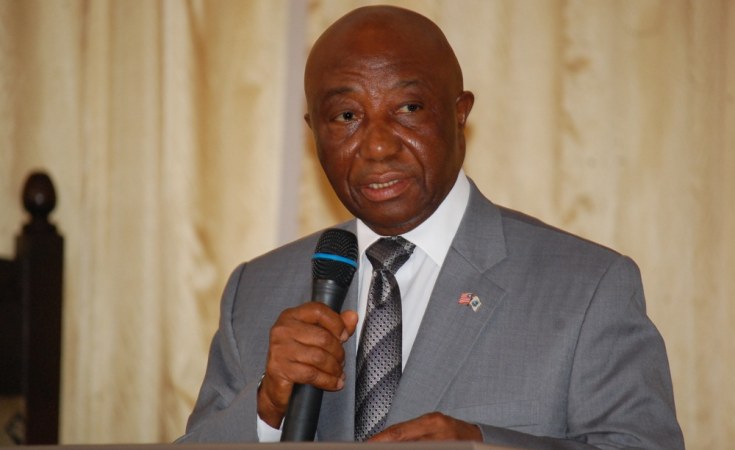Monrovia — Information gathered by FrontPageAfrica indicates that Ghana is slated to be the venue for the hosting of Liberia's long-awaited War and Economic Crimes Court. Perpetrators from the country's 14-year brutal fratricidal conflict will be tried and if convicted serve their sentences in the Ghanaian seaport town of Winneba. Winneba is a fishing town and capital of the Effutu Municipal District in the Central Region of Southern Ghana and lies 140 kilometers East of Cape Coast.
FrontPageAfrica has learned that negotiations are said to be concluding over the venue as the administration of President Joseph Boakai finalizes plans with international stakeholders pressing for the establishment of a war and economic crimes court for Liberia. The US Embassy has made it clear to Liberian officials that it considers the establishment of a War and Economic Crimes Court pivotal to ending impunity and putting Liberia on the path of national reconciliation and economic development.
FPA has gathered that some US$200 million has been set aside to finance the court's operations. What is unclear is how much of that money will come to Liberia and how much will go to Ghana.
'Truth is the Truth, JNB Says
President Boakai in an interview with war crimes advocate Alan White appeared to have given his blessings on the establishment of the court saying that Liberians need to know the truth about the civil conflict that killed hundreds of thousands and displaced more than half of the country's population internally and externally.
President Boakai lamented the issue of impunity he said has been a problem for Liberia for many years. "In every country, especially a country that boasts of independence for 176 years, and you know very well that it is because of the impunity, the disrespect, and disregard for justice that created all that we've seen in this country, and we believe we have to lay this to rest. Let all the facts be known; that people who think they're innocent prove their case and we can lay this to rest so that this country can move forward. It's not a witch-hunt, it's a matter of testifying to what you know and what you've done so that forgiveness can be done on the basis of merit and truth."
President Boakai noted in the interview with Mr. White that most of the people who were involved in the civil war are aware that if they were on the other side would like the truth to be told about it. "So, the truth is truth and each and every one has been offended and so we should be happy that this would finally close the chapter of that history that has been haunting us over the years and that's what we're talking about."
Lot of Victims, No Justice
The President also stated that a war crimes court will help restore peace and move people who have been victimized and those who are responsible for whatever, they'll know that justice was done, and their minds would be cleared and thank you for your role.
Between 1989 and 2003, the Liberian civil war resulted in the estimated deaths of 150,000 to 250,000 men, women and children, and the displacement of over half the country's population. All parties to the conflict were responsible for grave crimes and human rights atrocities, including torture, rape, sexual slavery, summary executions, and forced conscription of child soldiers.
Although Liberia has made significant progress in areas such as democracy, human rights, infrastructure development and security, an enduring culture of impunity for civil war era atrocities still lingers. Most Liberians believe a War and Economic Crimes Court would provide relief to victims and punish perpetrators, but others believe that special care should be taken to organize and implement the proceedings of the court in a manner that does not destabilize the postwar fragile country.
In his inaugural address in January, President Boakai addressed the issue: "We have decided to set up an office to explore the feasibility for the establishment of War and Economic Crimes Court (WECC) to provide an opportunity for those who bear the greatest responsibility for war crimes and crimes against humanity to account for their actions in court."
Civitas Maxima, the Swiss-based group which has been tracking perpetrators of the civil war and bringing them to justice, recently welcomed the statement by President Boakai.
Justice Amid Accountability Lapses
Civitas, in an Op-Ed recently published by FrontPageAfrica noted that Inaugural speeches by upcoming Liberian Presidents have always mentioned - in a way or another - the civil wars. But Mr. Boakai's words ring with a promise of action, of decisions. And this is unprecedented.
Added Civitas: "Just because there has been no accountability in Liberia, it does not mean that there has been no justice for Liberians. We at Civitas Maxima and the Global Justice and Research Project (GJRP) have been at the forefront of it, working hard to document atrocities, coordinate with investigators and lawyers, and to provide information to national authorities, so that if there is evidence against an alleged perpetrator residing abroad, this could be tested in a court of law. Almost 21 years have passed since the end of the second civil war, and in these years 15 individuals have faced proceedings related to the wars that destroyed Liberia. We have facilitated 11 of these cases, in 6 different countries, and across 2 continents. If not at home, at least abroad some victims found some justice."


